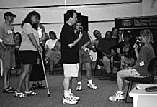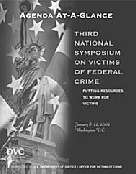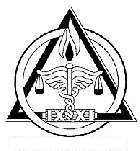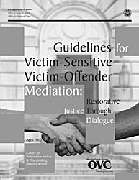Objective: To improve the knowledge, skills, and abilities of professionals working with crime victims.

The National Victim Assistance
Academy provides academically based learning opportunities for crime
victim advocates and allied professionals.
|
Professional Development Initiatives
Since its modest beginnings in the 1970s, the victim assistance movement has grown rapidly into a full-fledged field dedicated to meeting the physical, financial, and psychological needs of crime victims. More than 10,000 programs, many of which receive funding from OVC, exist across the country to support and assist victims in the aftermath of crime. As the field has developed, OVC has provided opportunities for members of this diverse field to come together to address standards and common approaches to serving victims. The following are two examples of OVC’s work in this area.
Victim Assistance Professional Development Consortium
While the victim services field has matured considerably over the past two decades, the rapid development of ideas, services, and programs has made it difficult to merge the various approaches for serving victims. In an effort to marry different approaches and provide a framework for consistent, quality services to crime victims, OVC funded the Center for Child and Family Studies at the University of South Carolina to develop a National Victim Assistance Standards Consortium (NVASC). The consortium is a multidisciplinary group of experts from the field that convened to examine standards and credentialing in victim assistance. A major goal of the consortium was to reach across geographic and philosophical divides to forge a common ground in victim services professional development.
Among the tasks performed by the group were drafting a common definition and mission to span the field of victim assistance. The group also examined existing standards drafted by state agencies, coalitions, and local service organizations. The consortium identified core individual and program standards—the common ground suitable for use in a variety of victim service settings. Members also identified points of divergence, in which specialized standards are more appropriate to meet unique task demands. Overall, the NVASC standards are intended as a resource for victim service practitioners, assistance programs, and communities.
National Training for VOCA Assistance Administrators
Around the Nation, VOCA assistance programs are administered by various state agencies, including criminal justice agencies, health and human service agencies, financial administration and grants management agencies, and governors’ offices. An association of VOCA victim assistance administrators is under development and will be formally established in October 2001. Its mission will be to provide technical assistance and training to ensure effective and efficient use of VOCA funds in all states. The association also will provide an avenue for enhanced communication between VOCA administrators.
OVC awarded a grant to the National Association of Crime Victim Compensation Boards (NACVCB) to provide training and technical assistance to state VOCA administrators. That initiative brought more than 300 VOCA compensation and assistance administrators and staff from 50 states to the National Training Conference in Chicago in September 1999. The conference was instrumental in helping participants explore ways to improve the delivery of services to crime victims. With supplemental funding for this project, NACVCB developed a Web site for VOCA administrators, a newsletter for VOCA victim assistance administrators, and a national training conference for VOCA victim assistance administrators. NACVCB also developed a resource center for VOCA victim assistance administrators.
Multidisciplinary Training Programs and Conferences
OVC has found that one effective way of educating and training practitioners from a wide variety of professions is to host multidisciplinary training programs and conferences. In the wake of a crime, professionals from many different disciplines often come together to address the myriad needs of crime victims. Through multidisciplinary training programs and conferences, OVC provides an opportunity for practitioners to come together in a classroom setting to address general rights and services for crime victims and the specific needs of certain populations.
|
National Victim Assistance Academy
The National Victim Assistance Academy (NVAA) has been the centerpiece of OVC’s efforts to provide academically based learning opportunities for crime victim advocates and allied professionals. NVAA is sponsored by OVC in collaboration with a coordinated group of cosponsors including the Victims’ Assistance Legal Organization, Inc. (VALOR); California State University–Fresno; the National Crime Victims Research and Treatment Center at the Medical University of South Carolina; the University of New Haven’s Center for the Study of Crime Victims’ Rights, Resources, and Remedies; and the Center on Violence and Victim Studies at Washburn University in Kansas. Students attending the 1-week course have the opportunity to earn undergraduate or graduate credits offered in multiple academic disciplines. One-third of all academy students opt to take the course for college credit. The academy offers two distinct levels of training and education:
The Foundation Level Academy. NVAA foundation level training is offered annually during the summer at selected universities. NVAA is a comprehensive, 40-hour, academically based course in victimology, victims’ rights, and victim services for victim service providers and allied professionals.
The Advanced Topic Series. Advanced topic workshops consist of 20–24 hours of academically based training and education in selected concentrations, including specific areas of victimization and victim assistance and training/education skills and techniques.

Students at the 2000 National
Victim Assistance Academy at American University in Washington,
D.C., participate in a role-playing exercise.
|
The number of students increased from a class of 268 students in 1998 to more than 350 each year in 1999 and 2000. The academy curriculum now contains more than 36 topics and is updated each year. An NVAA Web site was developed to link all academy material (www.nvaa.org), and a toll-free phone number was established (1–877–748–NVAA) to answer frequently asked questions free of charge. At the 1999 academy, the U.S. Attorney General praised NVAA for providing vital, comprehensive, and standard-setting training and education on victim issues, not just for criminal justice professionals but for all professionals whose lives touch victims.
State Victim Assistance Academies
Building on the success of NVAA, in 1999 OVC funded five states to develop effective strategies for establishing State Victim Assistance Academies. OVC’s goal for this project is to encourage the development of a network of state academies capable of meeting the foundation level educational needs of a broad range of victim assistance providers and allied professionals. The five states funded in 1999 were Colorado, Connecticut, Pennsylvania, Texas, and Utah. Each state has successfully completed the planning phase of the project and is now holding its own state academy. To help other states interested in developing state academies, OVC is publishing a compendium of planning guides developed by the five pilot states. OVC also provides trainers through its Training and Technical Assistance Center who offer technical assistance and teach at state-sponsored victim assistance academies.
|
Federal Symposium

OVC sponsored the Third National
Symposium on Victims of Federal Crime in Washington, D.C., in January
2001. The theme was "Putting Resources to Work for Victims."
|
|
National Indian Nations Conference
OVC sponsored the Seventh National Indian Nations Conference in September 1999, the goal of which was to improve the skills of multidisciplinary professionals in responding to the rights and needs of American Indian crime victims. The conference brought together state, tribal, and federal professionals who work on behalf of crime victims in Indian Country, and provided training to victim service providers, prosecutors, law enforcement officials, judicial personnel, social service personnel, and health and mental health professionals on best practices in establishing victim assistance services in Indian Country. The Eighth National Indian Nations Conference will be held in 2002.
National Economic Crime Summit
In May 2000, OVC and the Bureau of Justice Assistance were cosponsors of the National White Collar Crime Center’s (NWCCC’s) National Economic Crime Summit. More than 1,000 people from different disciplines attended the summit, including fraud investigators, electronic commerce representatives, victim advocates, and DOJ staff. OVC also sponsored scholarships for federal victim/witness coordinators from U.S. Attorneys’ Offices to attend the summit to improve their understanding of the complexities of fraud-related investigations and prosecutions and to gain insight into the unique needs of fraud victims. OVC staff moderated panels on victims of fraud, telemarketing fraud against the elderly, and national programs and federal offices that offer support to victims. In conjunction with the summit, OVC released a new bulletin, Victims of Fraud and Economic Crime. To further educate administrators and policymakers on the rights and needs of fraud victims, OVC was asked to contribute an article to NWCCC’s magazine, The Informant, on what resources and federal funds are available to assist victims of fraud and economic exploitation.
Training for Specific Professions
Each discipline that comes in contact with crime victims has its own educational and training requirements and a lexicon that is unique to that profession. The following are examples of OVC’s recent efforts to provide indepth, discipline-specific training to certain professional groups.
Training for the Health Care Community
The health care community is often the first to come into contact with crime victims who have been physically injured. The way in which victims are treated by health care providers can affect not only their physical health but also their mental health. Three of OVC’s recent projects targeting the health care community are listed below.

|
American College of Obstetricians and Gynecologists (ACOG). Because the majority of sexual assaults go unreported, many victims do not receive immediate medical care and only later consult physicians for health concerns arising from the assault. In 1999, OVC funded ACOG to develop, field test, and distribute to each of its 846 residency programs a curriculum on the provision of compassionate care to women with histories of sexual assault. This curriculum will provide instruction on screening victims, short- and long-term physical and psychological consequences of sexual violence, guidelines for followup care, recommendations for modifying clinical practices to avoid retraumatization, and guidance on establishing a copractice with mental health practitioners when warranted. The grantee anticipates that the curriculum will reach more than 1,100 young physicians, and subsequent ACOG practice guidelines will incorporate the information developed as a result of this project. These combined efforts will result in improved medical services for victims of sexual assault.
|
Family Violence Intervention Model for Dental Professionals. OVC provided grant funding to the University of Minnesota’s Program Against Sexual Violence and School of Dentistry to target a gap in existing knowledge and interventions in the field of family violence. Highlighting the fact that dental professionals are a relatively new but critical part of the medical response to family violence, this project has focused on educating new dental professionals, providing ongoing training for practicing dentists and their ancillary staffs, and integrating dental staff throughout the country into coordinated community responses to family violence. Training materials developed include a curriculum and two videos, which have been highlighted in the Family Violence Prevention Fund’s Health Resource Center newsletter and the journal Northwest Dentistry. With funding provided by the grant, and later with funds from the OVC Training and Technical Assistance Center, the project staff have provided this unique training to dental professionals nationwide.
Training for the Mental Health Community
Victims often suffer psychological, physical, and social trauma as a result of crime. There is a continuing need for more information about the mental health needs of crime victims and for education and training for mental health practitioners on this topic. In FYs 1999 and 2000, OVC undertook the following projects in this area:
Training for Social Workers. In March 1999, OVC funded the Texas Chapter of the National Association of Social Workers and the University of Texas to develop a national demonstration project on victim issues. The goals of the project were to raise awareness of the effect of violent crime on adult victims and their families, develop linkages between crime victim assistance professionals and social workers, and create a training workshop that introduces social workers to crime victims’ rights and services. The project was continued in FY 2000 and is now moving to rural states.
Training for Mental Health Providers on Terrorism and Mass Violence. OVC and the Center for Mental Health Services (CMHS) at the U.S. Department of Health and Human Services are developing training for mental health providers on assisting victims of terrorism and mass violence. CMHS already delivers excellent training and technical assistance to mental health providers on working with disaster victims. CMHS has conducted an assessment of current research, literature, and practice regarding the mental health needs of terrorism victims. CMHS is also incorporating the specific issues around mass victimization resulting from criminal acts into existing training programs and will present a modified training to victim assistance providers on the mental health needs of terrorism victims and make appropriate referrals.
Developing Guidelines for the Mental Health Treatment of Child Victims. OVC provided funding to the National Crime Victims Research and Treatment Center at the Medical University of South Carolina to develop practical guidelines for the mental health assessment and treatment of child victims of intrafamilial physical and/or sexual abuse. The guidelines were developed using current research and professional knowledge on assessment and treatment efficacy. The development process included input from the mental health community to ensure clinical utility, scientific integrity, and broad support from the child abuse field.
Institute for Professional Training on Mental Health Treatment for Child Victims and Witnesses. OVC also has funded the National Crime Victims Research and Treatment Center at the Medical University of South Carolina to develop a model training program to improve the mental health response to children who are victims of or witnesses to violence. An improved response requires mental health professionals who are knowledgeable about the initial and long-term consequences of violence and who have been trained in the most scientifically sound and clinically effective approaches to be available for assessing and treating victimized children. Young people, particularly teens, commit about 18 percent of crime but make up 33 percent of crime victims. Each year, about 3 million incidents of abuse and neglect are reported to child protective agencies. In addition, it is estimated that 40 percent of children witness serious violence in their lifetime. Research clearly documents the detrimental effects of exposure to violence on children. Effective intervention with child victims and witnesses is one of the most critical means of minimizing the effect of violence on children.
Homicide Support Project. OVC has funded the Virginia Mason Medical Center (VMMC) to develop a multidisciplinary approach to assisting families in the aftermath of a homicide. This approach is intended to reduce long-term psychological trauma; help family and friends cope with their grief and teach them how to regain control of their lives; and create a model for the criminal justice system, mental health care providers, and public and private crime victim agencies to share information, coordinate services, and find more efficient ways to assist this fragile population. Once completed, VMMC will work with other programs nationwide to establish similar multidisciplinary teams to replicate this approach.
Training for the Corrections and Probation and Parole Community
When OVC first stepped forward to take the issues of crime victims into the correctional arena, it did so amid an atmosphere of misunderstanding and suspicion. At times the mere mention of victim services to corrections officials and of corrections to victim advocates provoked an anxious or angry response. In partnership with corrections practitioners, however, there has been extraordinary success in breaking down barriers and changing attitudes and correctional practices across America. This systemic change affects thousands of correctional employees and even more victims of crime whose offenders are sentenced to some type of correctional supervision. A recent OVC project in this area is described below.
Corrections-Based Victim Services. In May 2000, OVC sponsored a Second National Corrections-Based Victim Services Colloquium. Two representatives from the victim units of each state’s adult department of corrections met in Washington, D.C. They discussed issues, identified promising programs and practices, and strengthened collaborative relationships to improve services to crime victims.
In FYs 1999 and 2000, a number of OVC-funded projects in the corrections field came to fruition. The products from these projects, listed below, are important resources for educating and training correctional employees and others about victim issues.

Guidelines
for Victim-Sensitive Victim-Offender Mediation: Restorative Justice
Through Dialogue (April 2000) is part
of the OVC Restorative Justice Collection of documents that cover
important issues related to restorative justice.
|
Promising Victim-Related Practices and Strategies in Probation and Parole. Developed by the American Probation and Parole Association in cooperation with the Council of State Governments, this document focuses on the function of probation and parole agencies and how they can effectively serve crime victims.
Guidelines for Victim-Sensitive Victim-Offender Mediation: Restorative Justice Through Dialogue. This is the first of a collection of documents developed by the Center for Restorative Justice & Peacemaking that cover important issues related to restorative justice. The other published documents are the National Survey of Victim-Offender Mediation Programs in the United States; the Directory of Victim-Offender Mediation Programs in the United States; Family Group Conferencing: Implications for Crime Victims; and Multicultural Implications of Restorative Justice: Potential Pitfalls and Dangers.
Victim Issues for Parole Boards. This video and guidebook set shares the perspectives of victims and parole board members about the value of victim participation in the parole decisionmaking process. It features examples from California, Massachusetts, and South Carolina, where special efforts have been made to increase victim participation.
|
Training for First Responders to Terrorism and Mass Violence Cases
OVC is funding the development of a training curriculum and exercises for first responders that will focus on the impact of terrorism and other mass casualty crimes on victims. The training will include psychological reactions, stress management, the needs of victims, available resources, statutory rights of victims, and secondary trauma in first responders. It also will feature components for agency heads, planners, and frontline first responders. Training for both groups will be delivered through the Office of State and Local Domestic Preparedness Support. The curriculum will be available through the Red Cross, the Federal Emergency Management Agency, and other avenues. Products will include a training curriculum, video, and brochure on what emergency response officials should know about terrorism/mass casualty crime victims; a bulletin for medical examiners and others who work with families of mass violence victims; and a handbook for first responders to victims of terrorism.
| Previous |
|
|
|
| Office for Victims of Crime Report to the Nation 2001: Fiscal Years 1999 and 2000 |
December 2001
|
